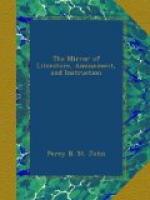“My endeavour in these pages shall be to give such information to emigrants, that they may not be disappointed on their arrival in Canada;—that they may know how to proceed and where to go, and not as too often happens, waste their time and their money in the great towns, making fruitless inquiries of people just as ignorant of the nature and capabilities of the country as themselves with this difference, that they are aware of their ignorance, whereas their advisers think they know something about the matter, and thereby often unintentionally mislead and deceive them. In looking over this my introduction, I find I have been most abominably egotistical;—so much so indeed, that my printer, were I to continue through the work in this strain, might have the same excuse that poor John Ballantine had for his delay in printing a learned work by the Earl of B——, viz. that he had not a sufficient number of capital I-s in his printing-office. But if the reader will overlook this fault for once, I shall try to avoid it in future.”
The first chapter opens with the cause of the present distress: then comes the remedy, and a reply to the question, Who are to go to Canada?—
“In the first place, all who cannot comfortably support themselves by their labour at home; because let a man be ever so poor in this country, his wages as a labourer will more than support his family,—and if he be prudent and sober, he may in a short time save money enough to purchase for himself a farm,—and if he has a family, so much the better, as children are the best stock a farmer can possess, the labour of a child seven years old being considered worth his maintenance and education, and the wages of a boy of twelve or fourteen years of age being higher than those of a stout and skilful ploughman in most parts of Great Britain, generally from three to four dollars a month, with bed, board, and washing besides. At home they talk of ‘a poor man with a large family;’ but such a phrase in Canada would be a contradiction of terms; for a man here who has a large family must, under ordinary circumstances, soon cease to be a poor man. Mechanics and artizans of almost all descriptions,—millwrights, blacksmiths, carpenters, masons, bricklayers, tailors, shoemakers, tanners, millers, and all the ordinary trades that are required in an agricultural and partially ship-owning and commercial country, will do well to come to Canada.
“Of these trades, the blacksmith, tailor, shoemaker, and tanner, are the best. If there were in nature (which is doubtful) such a being as a sober blacksmith, he might make a fortune. One exception there is, however, in the case of mechanics. First-rate London workmen will not receive such high wages either positively or relatively, as they would at home,—for this reason, that there are few on this continent who either require or can afford work of the very first order, and those that do, send to London for it.”




